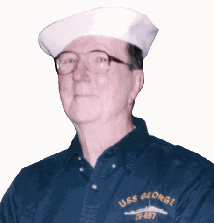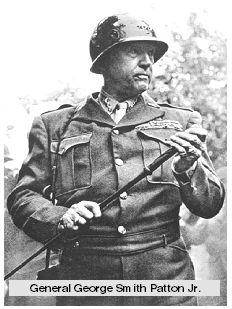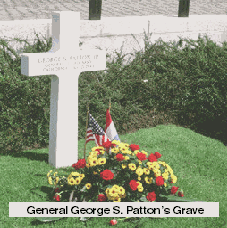|
The code name for Patton's Third Army was "Lucky", and it was indeed a lucky army under his leadership. Even as a small boy, he dreamed of being a soldier. When he graduated from the West Point U.S. Military Academy he said, "It is as natural for me to be a soldier, as it is for me to breathe." Patton's Third Army fast became a legend. It moved faster and farther than any other army in history. In 231 days of active duty it liberated territory in France, Luxembourg, Belgium, Germany, Austria, and Czechoslovakia. Altogether, Patton's Third Army captured 1,280,688 prisoners of war, killed 47,500, and wounded another 115,700 Germans.
However, at this point in time, during his mad dash to liberate Bastogne, Lieutenant General Patton was brought to a standstill. He was bogged down, literally stuck in the mud, because it had rained and rained and rained, and was still raining. Some of the foot soldiers (infantry) complained that the mud was almost waist deep. Jeeps, trucks, and even tanks could not move, for they were stuck in the mud. Two full scale counter-attacks had to be postponed.
On December 14, 1944, General Patton called the Third Army Chaplain, James O'Neill into his office in Nancy, France. "Chaplain, I want you to write a prayer for some good weather. See if we can get God to work for us." Chaplain O'Neill answered, "That will take a mighty thick rug for that kind of praying." Patton replied, "I don't care if it takes a flying carpet, just get it done!" "But General, us chaplains do not usually pray for clear weather in order to kill our fellow men." Patton now grew much louder as he spoke, "I said I want that prayer, and I want it now!"
The army field topographical company printed 250,000 copies of this prayer. Because General Patton said, "I want every soldier in my Third Army to pray!" And as Christmas was very close, the general wrote a short Christmas message on the reverse side of the prayer card: "To each officer and soldier in the Third United States Army, I wish you a merry Christmas. I have full confidence in your courage, devotion to duty, and skill in battle. We march in our might to complete victory. May God's blessing rest upon each of you on this Christmas day. G.S. Patton Jr., Lt. General commanding Third U.S. Army."
The soldiers received the prayer cards on December 22,1944. The next day, the weather cleared and remained perfect for six days. On Christmas day, thanks to quartermaster corps, every soldier in Patton's Third Army had some turkey. Those in the front lines had turkey sandwiches, and the rest had hot turkey. No other army in the world could perform such a feat!
On December 24, 1944, Chaplain O'Neill returned to General Patton's office, which was now in Luxembourg. the general shook his hand, and pinned a bronze star medal on his chest. "You sure do stand in good with God and my soldiers. You are the most popular man in this office too." Patton liked to cuss and present as a rough and tough old warrior. But he said, "Why yes, I believe in God, there are no atheists in the fox-holes."
|
|





